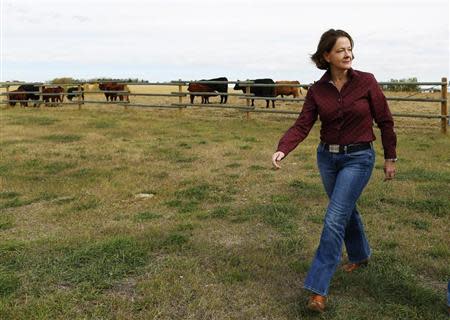Alberta, B.C. closer to pipeline deal; hurdles remain
By Julie Gordon and Nicole Mordant VANCOUVER (Reuters) - Alberta and British Columbia have edged closer to a deal that could help clear the path for the development of new oil pipelines to connect Canada's oil sands to the Pacific coast, although many obstacles remain. In a framework agreement announced on Tuesday, Alberta Premier Alison Redford agreed to support five conditions laid out last year by her British Columbia counterpart, Christy Clark, if that province was to support construction of oil pipelines across British Columbia's pristine north. The premiers of the two westernmost Canadian provinces agreed Alberta would not share royalty revenue from oil production in the province and that British Columbia had the right to negotiate with the oil and gas industry for appropriate economic benefits. The agreement removes one roadblock from Enbridge Inc's C$6 billion ($5.74 billion) Northern Gateway project, a 525,000 barrel per day pipeline from Alberta's oil sands to the port of Kitimat in B.C. The project is a key part of efforts by the federal and Alberta governments to open up export markets to Asia at a time when congestion on pipelines taking oil to the United States means crude is getting bottlencked in Alberta. "In all five areas we are seeing progress. That doesn't mean that we snap our fingers and overnight it is done, but we are making good progress all the way along and that's important," Redford, standing next to Clark, told reporters after the two premiers met in Vancouver on Tuesday. The line, which is awaiting regulatory approval, still faces bitter opposition from environmental groups and aboriginal communities along its route. "This so-called deal will not break the unbroken and growing wall of opposition to tar sands pipelines and tankers in British Columbia," Mike Hudema of Greenpeace Canada said in a statement in response to Tuesday's agreement. Along with demanding economic benefits from the line, Clark's five conditions also included world-leading oil-spill response and clean-up systems and aboriginal consultations. Asked if she had backed down on earlier demands for a share of pipeline royalties, Clark said: "I have always recognized, and I've said it from the beginning, we don't know what form the economic benefit for B.C. could take." She cited a refinery as one of the potential benefits for British Columbia, which could provide thousands of jobs and tax revenue for the province. Clark also noted that her government has an interest in ensuring provinces protect their royalties, as British Columbia gets substantial royalties from its growing natural gas industry. Six months ago the British Columbia government said it could not support construction of Northern Gateway because it believed Enbridge had not adequately spelled out how it would respond to oil spills from the line. In its final written submission to the Joint Review Panel charged with recommending whether the project should proceed, the province's Liberal government said Enbridge's response plans for land and marine spills from the line had not yet been firmed up. The panel is due to deliver its recommendations by year end. ($1 = 1.0447 Canadian dollars) (Additional reporting by Scott Haggett in Calgary. Editing by Andre Grenon)

 Yahoo Finance
Yahoo Finance 

